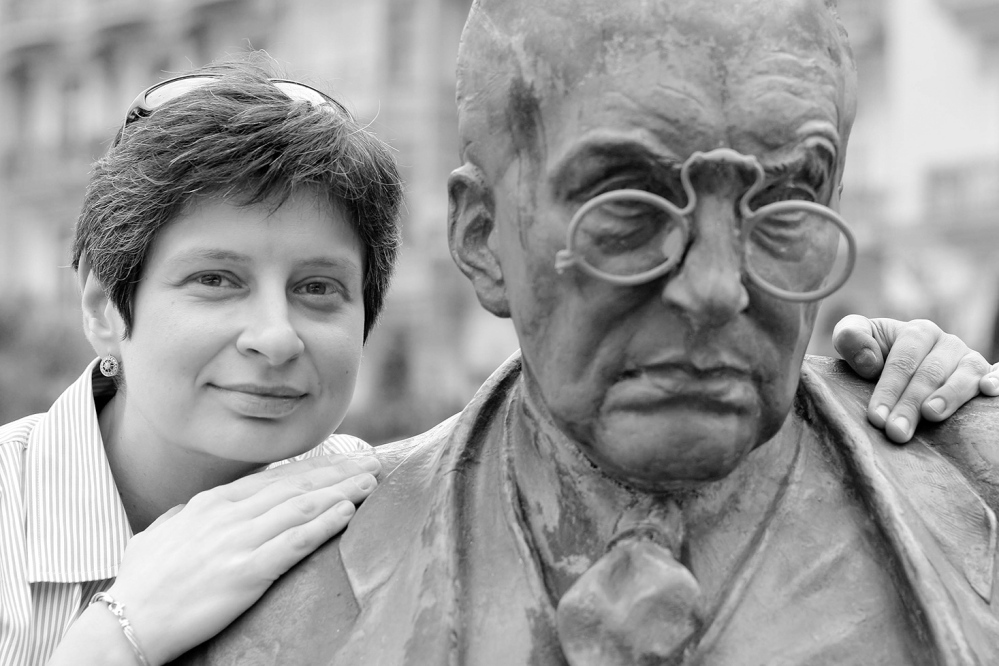“Once an agent, always an agent.” This was the terse response of Nina Khrushcheva on New Year’s Eve 1999 when her mother commented favorably about the new president, Vladimir Putin, who was then speaking on TV.
Khrushcheva, great-granddaughter of former Premier Nikita Khrushchev, was prescient then and feels no need to revise those comments now. Instead, her mother’s early reviews were symptomatic of what Khrushcheva calls the “gulag of the Russian mind,” part of the title of her just-published book, “The Lost Khrushchev: A Journey into the Gulag of the Russian Mind.”
This particular gulag refers to a mindset that includes, as her mother’s optimism implied, the hope that the next czar will be better than the last. It also refers to the still-lingering sense among many Russians that Russia was better off before its post-Stalinist reforms. Putin has gone so far as to say the collapse of the Soviet Union was a catastrophe.
Speaking to the Federation Council on Tuesday, he more or less blamed Khrushchev for the current mess in Crimea, noting that Khrushchev initiated the Crimean transfer.
As translated by Khrushcheva from Russian, Putin said, “It was unclear what Khrushchev was motivated by. Maybe he wanted the Ukrainian nomenclature to be on his side. Maybe he felt responsible for the mass repressions he organized in Ukraine.”
“Really?” says Nina, her eyebrow an audible arch. “Mass repressions? And this from the man who has been trying to rehabilitate Stalin, the czar of mass repressions, since the moment he got into the Kremlin. Oh the gulag of the Russian mind!”
Khrushcheva, an associate professor of international affairs at The New School in New York, is no fan of Putin, one might have guessed. A woman who prefers simplicity, she is direct, blunt and, at times, wickedly funny. Would that President Barack Obama had a foreign policy, she says, adding that she is a loyal Democrat. Would that Americans understood Putin for what he is — no mere bully, he is “an old KGB chinovnik [petty clerk].”
Although Putin enjoys the popular image of the terrifying KGB agent, Khrushcheva says he was really a clerk whose nickname was “Moth.” More Miss Moneypenny than James Bond.
In his own mind, Putin is “messianic, a uniter of lands, and corrector of historic wrongs,” Khrushcheva says sarcastically. Which is to say, he is often delusional. Yet his delusion is buffeted by the wounded pride of his countrymen, many of whom also want to see the motherland restored to greatness.
While American observers try to predict Putin’s next moves, Khrushcheva has been on target thus far. Her prediction on Feb. 20 that Putin would go into Ukraine — and six days later that Crimea would be taken over — was exact. Her (measured) prediction now is that Putin won’t pursue Ukraine if only because it is too expensive to invade another country.
It is possible, meanwhile, that Putin’s yawning response to Western penalties could mean that he doesn’t fully realize the effect sanctions could have because he doesn’t fully understand how free economies and markets work. As Khrushcheva says, “You can’t order them [markets] not to panic.”
Although the recent rollout of sanctions on members of Putin’s inner circle, viewed as weak, were followed by a Russian market rally, stronger sanctions could be more damaging. Then again, it may be that Putin doesn’t really care. His interest isn’t in today’s markets but in tomorrow’s empire.
Crimeans, 97 percent of whom voted to become part of Russia (against a backdrop of heavily armed Russian troops), may be deluding themselves in thinking that they might become another Sochi — rebuilt in splendor in preparation for the Winter Olympics. Asks Khrushcheva, does Russia really have another $50 billion to create a new showpiece?
Meanwhile, the key to preventing tensions from further escalating is for the European Union and NATO to chart a firm course with Kiev — and they must mean it. “What Putin hates is idle talk.”
As for allowing Putin to save face, as many commentators have opined, never mind. As far as Putin is concerned, he’s in charge. He’s the leader who keeps his word. Putin said he’d take Crimea — and he did. If he doesn’t go further into Ukraine, it won’t be to save face but to allow others to relax. And for his beneficence, Crimea will be forgiven?
This is his calculation, in Khrushcheva’s analysis, and one can only hope that Putin the agent explores his inner magnanimity and feels good about himself at the end of the day.
Kathleen Parker is a Pulitzer Prize-winning syndicated columnist and a member of Washington Post Writers Group. Email at kathleenparker@washpost.com.
Send questions/comments to the editors.



Success. Please wait for the page to reload. If the page does not reload within 5 seconds, please refresh the page.
Enter your email and password to access comments.
Hi, to comment on stories you must . This profile is in addition to your subscription and website login.
Already have a commenting profile? .
Invalid username/password.
Please check your email to confirm and complete your registration.
Only subscribers are eligible to post comments. Please subscribe or login first for digital access. Here’s why.
Use the form below to reset your password. When you've submitted your account email, we will send an email with a reset code.